Surviving on the front line. Part 1: Granitnoye
The war forced many people to leave their homes and go in search of a safe life. But not all could take this step. Someone stayed "under fire" and got used to daily shelling and sleepless nights.
The correspondent of OstroV spent a few days in three villages (Marinka, Krasnogorovka and Granitnoye) and saw with his own eyes how people live, literally on the fire line. Shelling at these villages does not stop today.
The article will focus on Granitnoye - one of the hottest points of the "M" sector.
On the way to Granitnoye
"Do not stand on the grass and do not move away from the curb. You can be undermined," - it is the very first statement stated by UNHCR representative who accompanied us on the trip to the ATO area.
Before entering Granitnoye the entire group of journalists was asked to wear flak jackets and helmets. The village and positions of the military in the area are under constant shelling by the "DPR".
The first stop is checkpoint before entering Granitnoye. You can enter and leave the village only with passports and after a thorough inspection of the vehicle. We, a group of journalists and UNHCR staff, were kept for about an hour at the checkpoint before being allowed to enter. It happened despite the fact that all were accredited in the ATO area.
The checkpoint is also a temporary home for a few soldiers: they sleep right there in the trenches and at night face projectiles and bullets "from the other side".
"Look, look, the projectile flew and fell onto the road and did not explode, over there under the wheel, we covered it on purpose. Ceasefire, shit ......," - said one of the men.
One of the first questions that interested the journalists is where the position of the "DPR" is and where they fire from.
"300 meters away from us and it is not our territory, more precisely, we do not control it. As for the position of "orcs", so it is about 1 kilometer, you can see from here. Look there, near a small tower. They like to shoot from there," - said the soldier.
"Therefore, be careful and do not disperse! They shoot at the road!" - said his colleague menacingly.
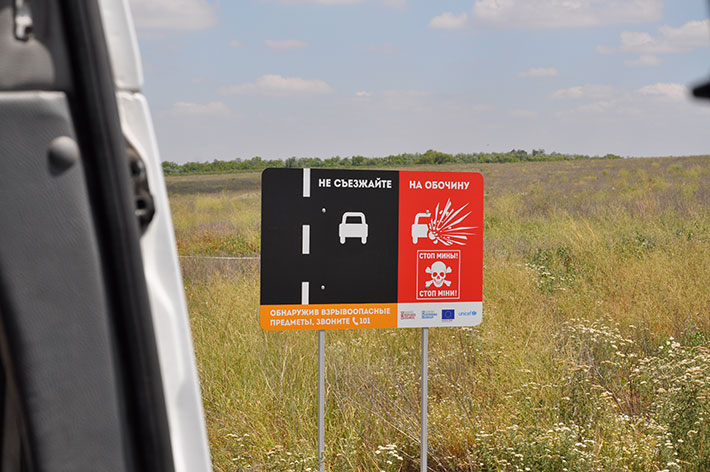
There are many of such signs in the ATO area
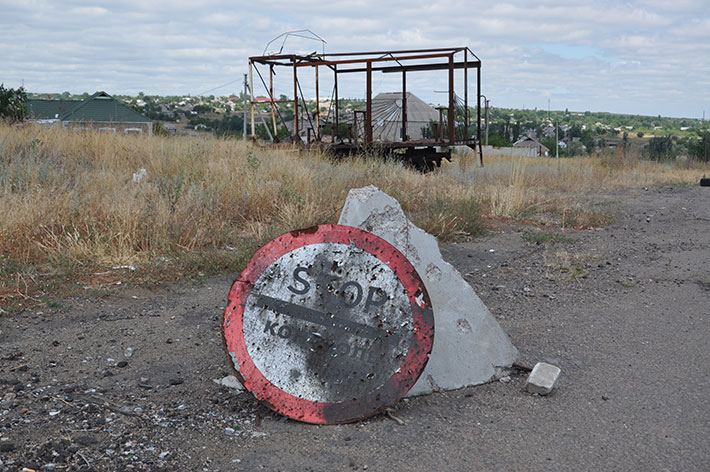
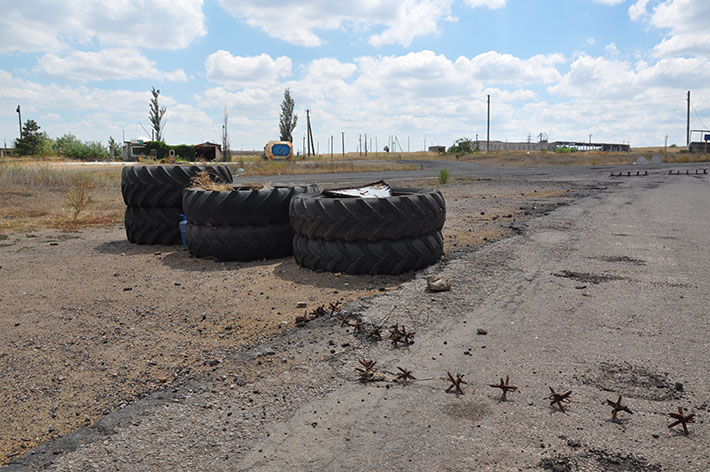
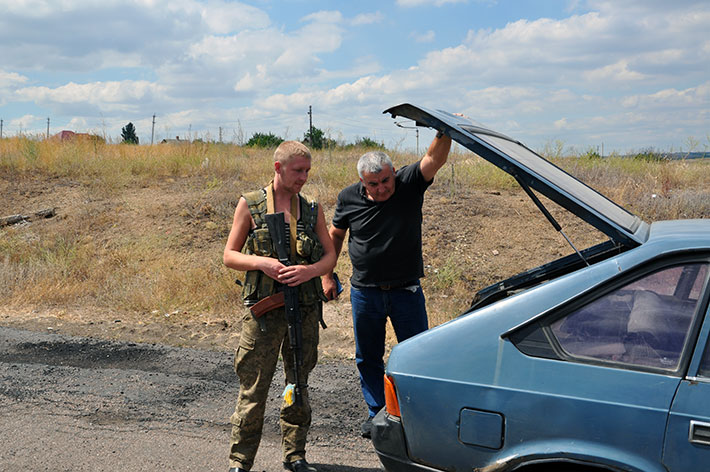
Checkpoint in Granitnoye
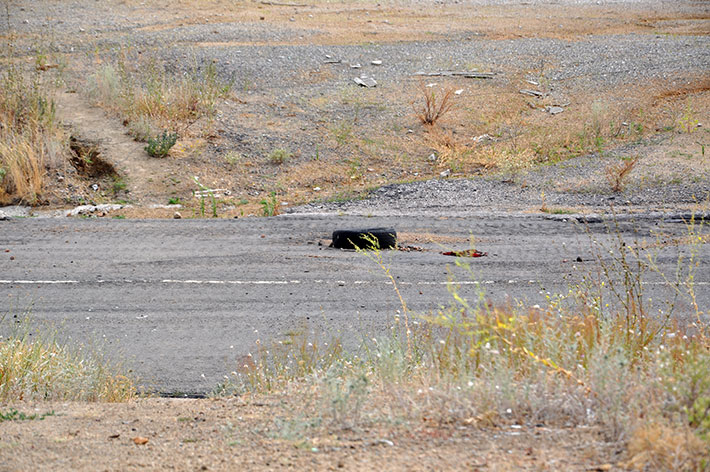
Unexploded shell covered with a tire
"It is not a war." Acquaintance with the head of Granitnoye village
So, we enter Granitnoye escorted by military and local head of the village Leonid Khaytulov. I’d like to tell about this figure separately.
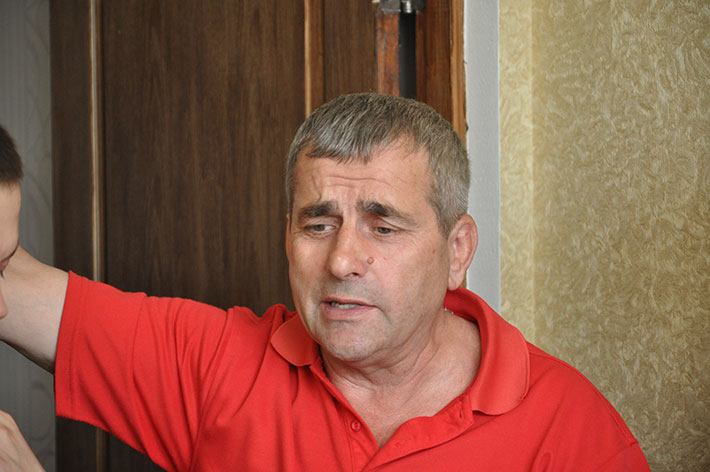
Head of Granitnoye Leonid Khaytulov
At some point the SSU was actively interested in him, accusing of separatism. They even opened a criminal case which was later closed.
According to local residents, in 2014 Khaitulov "ran through the village with the "DPR" flag and corresponding slogans." The head himself denies all charges and calls himself a patriot and supporter of unified Ukraine.
"Everything will be fine. Remember that I am for unified and independent Ukraine. And do not believe when they say that only separatists live here. It is not true. Great patriots live here, greater than in Lvov, because people did not leave for anywhere," - he assures us.
At the same time, journalists started an interesting dialogue with Leonid about who is to be blamed for this whole situation and who we are fighting against.
- It is not a war. I'll tell you who it is beneficial for to continue everything. But it is not a war against us. You do not know, but I'll tell you the truth. The war is between the US and Germany. Russia and Ukraine are just involved in this war. It is the struggle for influence of Europe and America, - he says.
- And then what do the military from Russia do here? – we clarify.
- I beg you! Because they made Russia an evil empire, but it's just an empire. And it will not tolerate the NATO missiles in Sumy region! - continues confidently the village head.
- Are there rockets in Sumy region?
- Believe it or not! Just imagine!
- Russian soldiers are not from fantasy.
- I'm telling you, America did its best!
There was no point to continue the dialogue. After such a dialogue with the local government representative, you start to realize that in the case of the arrival of the Russian world, nobody will fight against it. But L. Khaytulov has been ruling the village for 24 years. And, judging by his words, he is not going to give it up.
He told a lot about his patriotism, treated with chebureks and complained that the central power did not help the village and did not allocate money. But most of all he is proud of the fact that did not leave Granitnoye and evacuate as the military recommended.
"It is our village. Here are our houses. We have not left and are not going to do that. No matter what," - he emphasizes.
Life in Granitnoye
At the moment about 2,700 people live in Granitnoye (before the war - 4000). About half of them is pensioners. 10 locals were killed and 37 were injured during the war.
The school has 170 pupils and there are 50-60 children in the kindergarten. They expect more by September.
"People return. Many people left for other regions of Ukraine, lived there without housing and work, and now they return. What else should they do? They have houses here and some farm," - said director of the kindergarten Maria.
We met local woman Galina and her daughter near the kindergarten. We talked. It seemed that the girl had optimism and faith in better enough to survive more than one war.
"Of course, it is terrible. What should we do? We were born and grew up here. All our relatives did not go anywhere. We're all here. It’s hard with work. If we need a hospital, then we go to Volnovakha (by car about 1-1.5-hour drive - OstroV), but sometimes doctors come to us. Conditions are not so bad. We even don’t think of leaving. Where can we go? I think the worst is in the past. The most important is that we are not bombed and fired, and that all are alive and healthy. Let’s hope for the best," - she says.
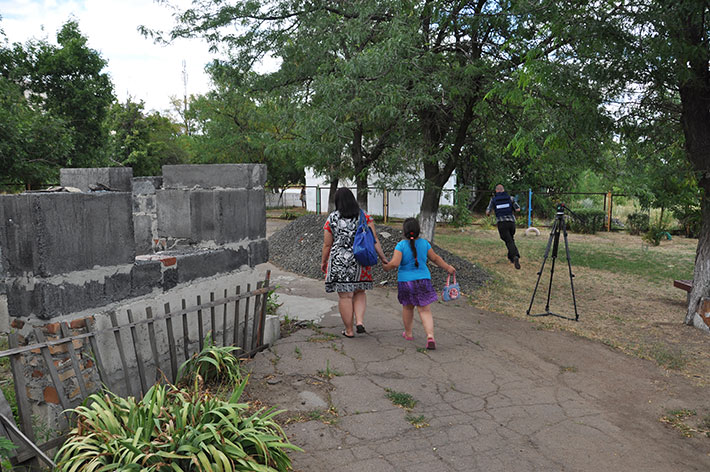
Galina and her daughter go home from kindergarten
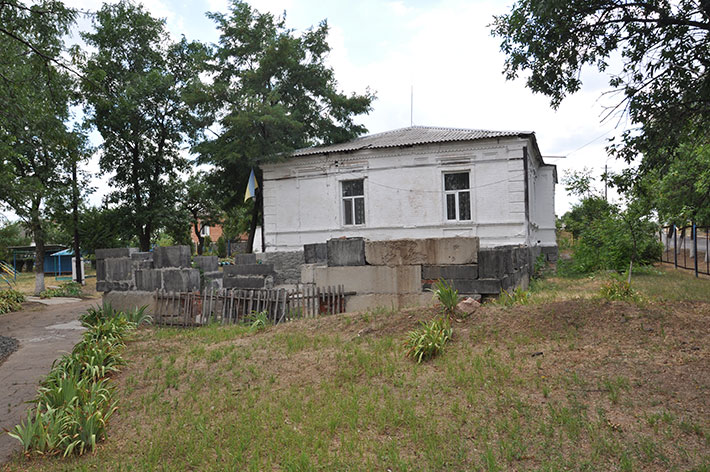
Kindergarten
If it is more or less clear with housing, then the situation with work is much worse. The only company, which employed a majority of villagers, is closed now.
"There is no work in the village," - says village head L. Khaitulov.
There are many problems in Granitnoye. Repair and restoration work has not stopped for a single day. The village was left without electricity because of the constant shelling for about 1.5 years.
"That evening, when light was restored, people cried. When children came to kindergarten, they told that they had cried from happiness and their voices hoarsened. They watched cartoons until 3 a.m. You don’t need much to be happy," - recalls director of the kindergarten Maria.
The school that was heavily shelled in 2014 is located opposite the kindergarten. "Thank God, no child was hurt then. The school was empty that day," - says the head of the village.
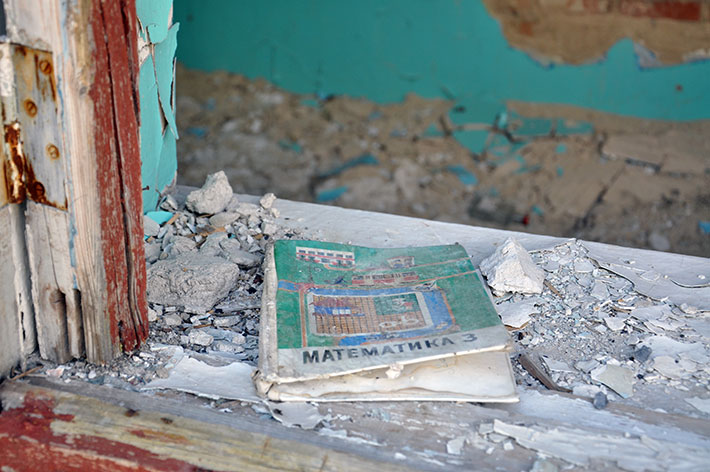


Village school after shelling
Galina and Nikolay are pensioners living alone in a small house in Granitnoye. Two sons died before the war. Nikolay is a disabled person; he does not have two legs. Galina walks with difficulty; she says that her blood pressure is constantly jumping. Their house was heavily damaged during the attacks: there is almost no roof, the walls were destroyed. But they have restored the roof and started to repair the house with the help of international organizations. At the end Galina decides to thank Rinat Akhmetov for some reason...
- Thank you very much to this ... what's his name ... Akhmetov! Let God give him health for a lifetime and that way before him be always soft and warm. Thanks to him.
- What does he give you?
- What does he give? Different cereals. And my husband is a diabetic, he is very fond of pasta and cereals.
- How often do they bring help from Akhmetov?
- It depends. Sometimes once a month, twice or thrice.
Galina loves animals, so we saw a couple of cats and dogs in her yard, they began to ask for food when saw us. We didn’t deny.
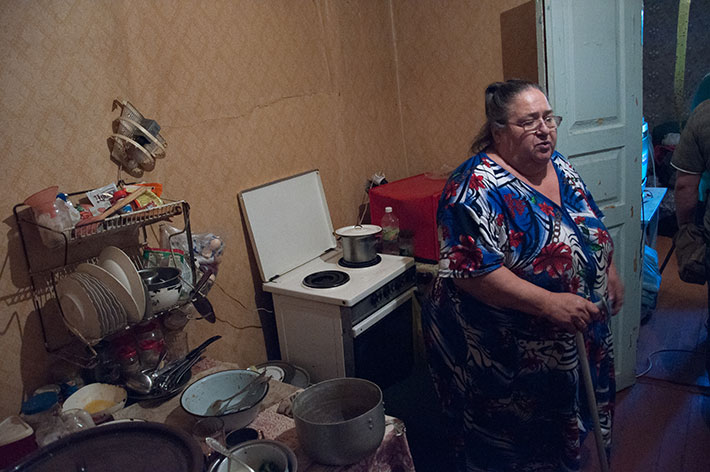
Galina "says thanks" to Akhmetov
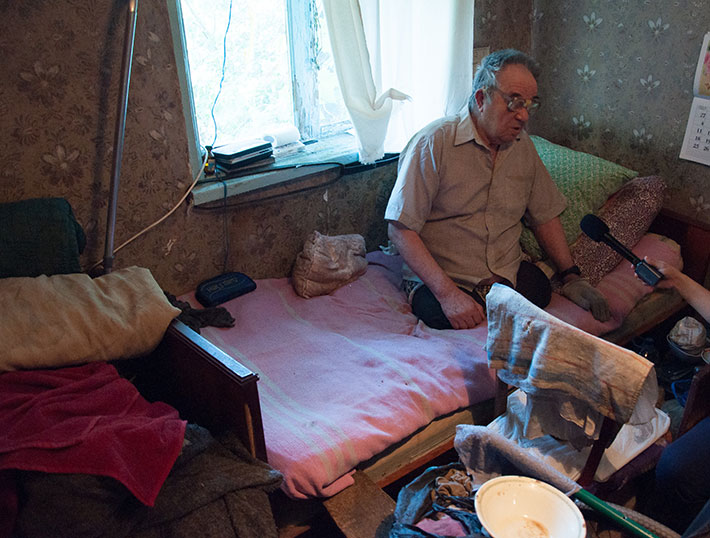
Nikolay can hardly get out of the bed
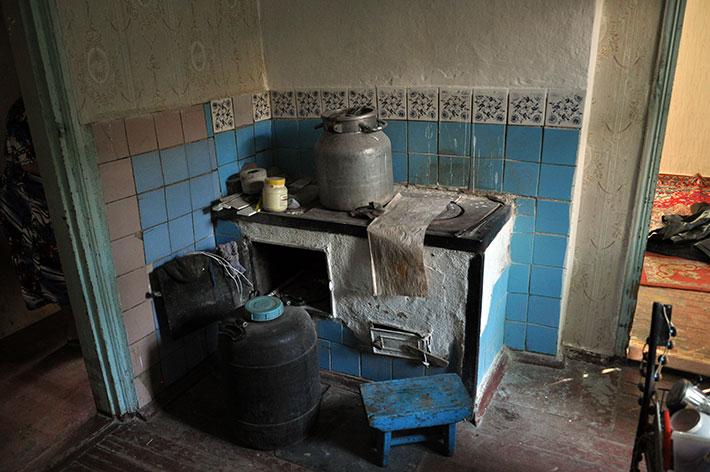
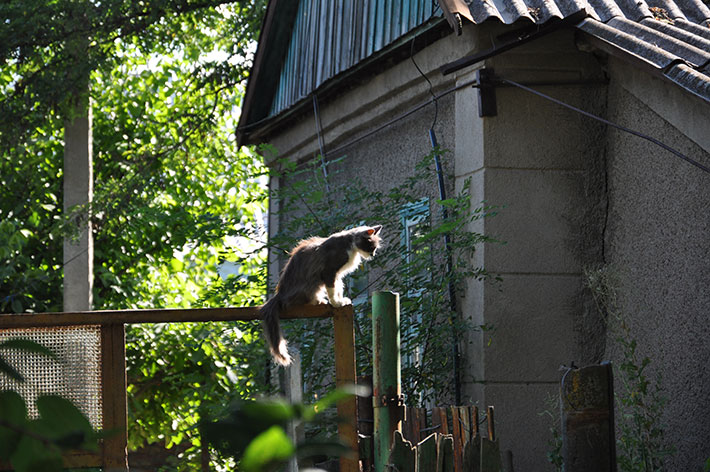
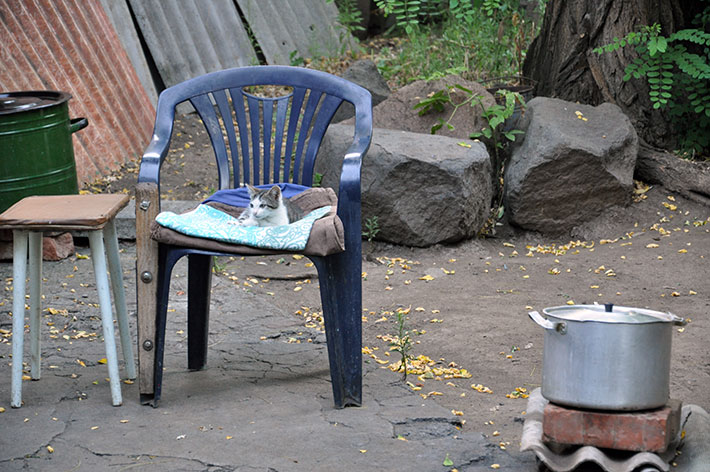
Galina and Nikolay’s house
"There is no safe place in the village and you are unlikely to find, at least, one house that wasn’t shelled or damaged," - said Leonid Khaitulov.
It is true. The walk around Granitnoye showed that all houses were shelled at a greater or lesser degree. Some glasses are smashed, some roofs are patched, some fences or exterior walls are full of holes from bullets and shells. There are more serious damages.
Only international partners help to restore the village. For example, UNHCR regularly monitors the needs of local residents in building materials, coal, hay and other vital needs. The head of Granitnoye complains that there is no help from the government of Ukraine, although he has repeatedly called, written letters and so on.
At the end he once again assured us of his pro-Ukrainian and patriotic position and asked "not to write lie" about the fact that only separatists live there. "Our only problem is rulers. But it can be resolved," - he said.
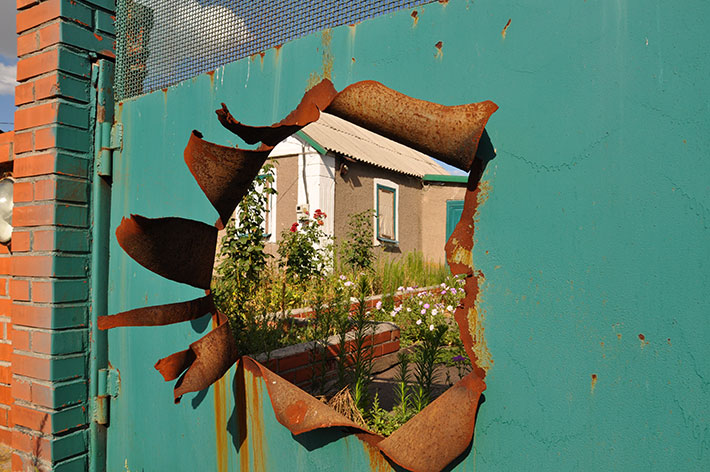
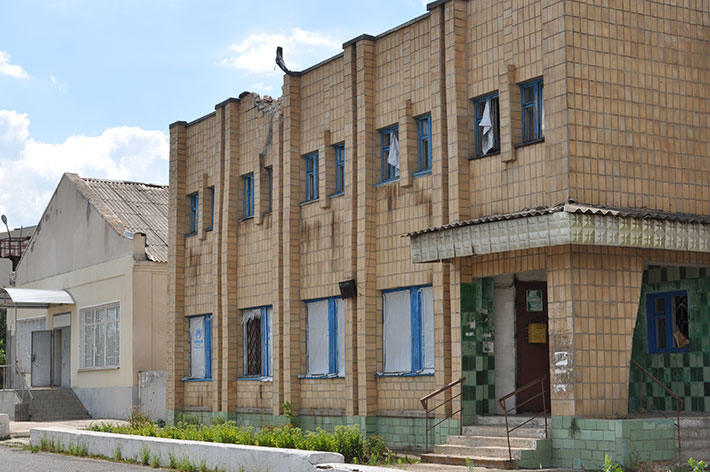
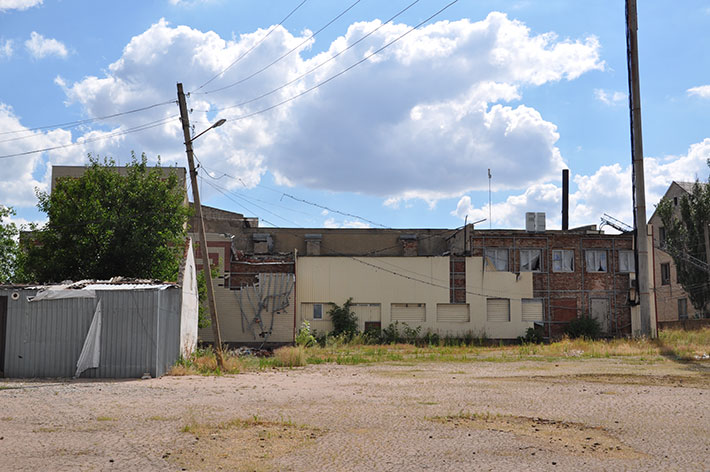

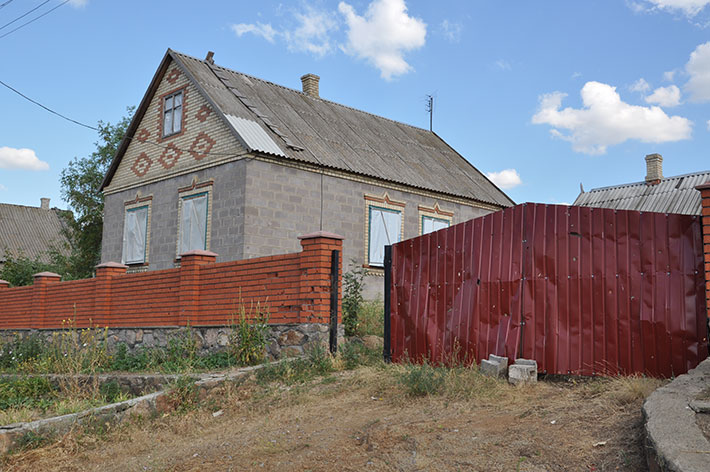
Destruction in Granitnoye due to shelling
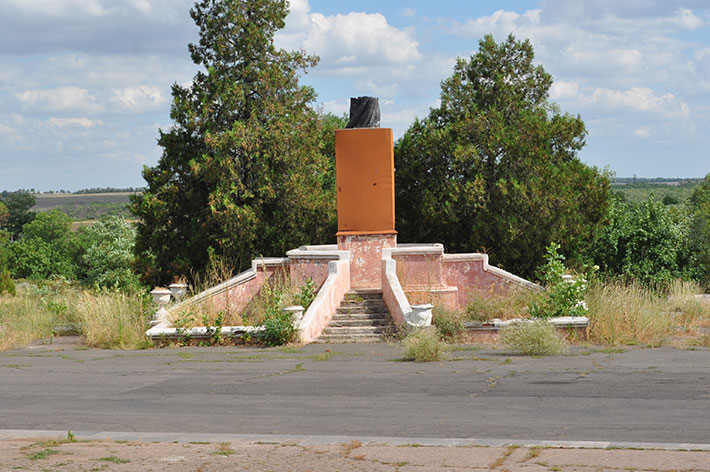
Decommunization in Granitnoye. A statue to Lenin used to stand here
We met Valentina - a woman of 50-60 years already on the outskirts of Granitnoye. During the conversation we found out that her husband was killed by shelling and her arm was wounded - a splinter from a shell. And last time Valentine undermined on a trip wire, resulting in serious leg injury. I had to do the surgery, but the leg still does not bend.
She did not want to talk to journalists. She repeated all the time that he would not say anything and requested not to be filmed. Nevertheless, he continued to talk about her life and the village.
"I do not want anything. I do not need any help. Let it end. Tell everyone!!!!" - almost cried Valentina. It was a cry of pain, despair and helplessness which sounds in the head for a long time.
It seems that Valentina represents all residents of frontline Granitnoye and other similar villages that do not ask but shout: "Let it be over. Let the fire be ceased. We need nothing more. We ask for nothing more."
To be continued.
Vladislav Bulatchik, OstroV
